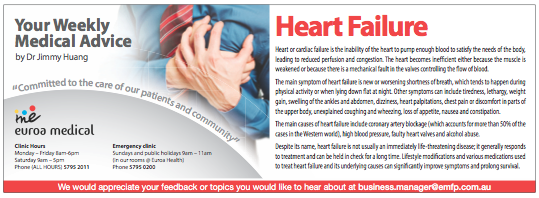
Heart or cardiac failure is the inability of the heart to pump enough blood to satisfy the needs of the body, leading to reduced perfusion and congestion. The heart becomes inefficient either because the muscle is weakened or because there is a mechanical fault in the valves controlling the flow of blood.
The main symptom of heart failure is new or worsening shortness of breath, which tends to happen during physical activity or when lying down at night. Other symptoms can include tiredness, lethargy, weight gain, swelling of the ankles and abdomen, dizziness, heart palpitations, chest pain or discomfort in parts of the upper body, unexplained coughing and wheezing, loss of appetite, nausea and constipation.
The main causes of heart failure include coronary artery blockage (which accounts for more than 50% of the cases in the Western world), high blood pressure, faulty heart valves and alcohol abuse.
Despite its name, heart failure is not usually an immediately life-threatening disease; it generally responds to treatment and can be held in check for a long time. Lifestyle modifications and various medications used to treat heart failure and its underlying causes can significantly improve symptoms and prolong survival.
Written by Dr Jimmy Huang

